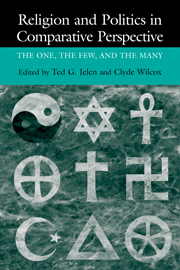Book contents
- Frontmatter
- Contents
- List of Contributors
- Preface
- 1 Religion: The One, the Few, and the Many
- 2 The Challenge of Pluralism
- 3 Catholicism, Politics, and Culture in the Republic of Ireland
- 4 Religion and Politics in Iberia
- 5 The Religious Dimension of Israeli Political Life
- 6 Between Heaven and Earth
- 7 Islamism in Contemporary Arab Politics
- 8 Religion and Politics in a Secular Europe
- 9 Religion and Democracy in South America
- 10 Looking for Hope in Central America
- 11 Religion and Politics in India
- 12 Religion and Politics in Japan
- 13 Religion and Politics in an Open Market
- 14 The Political Roles of Religion
- Index
5 - The Religious Dimension of Israeli Political Life
Published online by Cambridge University Press: 05 June 2012
- Frontmatter
- Contents
- List of Contributors
- Preface
- 1 Religion: The One, the Few, and the Many
- 2 The Challenge of Pluralism
- 3 Catholicism, Politics, and Culture in the Republic of Ireland
- 4 Religion and Politics in Iberia
- 5 The Religious Dimension of Israeli Political Life
- 6 Between Heaven and Earth
- 7 Islamism in Contemporary Arab Politics
- 8 Religion and Politics in a Secular Europe
- 9 Religion and Democracy in South America
- 10 Looking for Hope in Central America
- 11 Religion and Politics in India
- 12 Religion and Politics in Japan
- 13 Religion and Politics in an Open Market
- 14 The Political Roles of Religion
- Index
Summary
Was Israel established by King David or Theodore Herzl?
Bishara Azmi, 1997As the world's only Jewish state – Jewish both by design and population – Israel presents a unique set of questions to students of religion and politics. How large a role does Judaism play in the politics of contemporary Israel? How does the political system balance the imperatives of Jewish law and the demands of governing a modern state? How are conflicts between religious groups moderated? In what ways does Judaism influence the nature and conduct of political life? Does Judaism reinforce or undermine the maintenance of a democratic regime? Do the distinctive qualities of Judaism promote a different style of politics from that associated with states dominated by Christian or Muslim populations? How does the fact of Jewish dominance influence the treatment of non-Jewish minorities who live in the state? How does the character of the state influence Jewish religious groups themselves?
The breadth of questions precludes definitive answers in a single chapter. Indeed, entire volumes have been devoted to each of the questions raised in the preceding paragraph (Abramov 1976; Dowty 1998; Liebman and Don-Yehiya 1984). The central focus of this chapter is Israel's identification as a Jewish state. That is the quality that sets Israel apart from the other nations covered in this volume and, indeed, the trait that distinguishes Israel from all other states that have existed in the modern world.
- Type
- Chapter
- Information
- Religion and Politics in Comparative PerspectiveThe One, The Few, and The Many, pp. 97 - 122Publisher: Cambridge University PressPrint publication year: 2002
- 2
- Cited by



